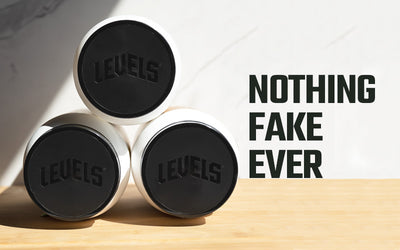There’s lots of buzz out there about the ketogenic diet, which is technically a low-carb diet. But are there any differences between keto and low-carb dieting? Read on to learn more.
What Is a Low Carb Diet?
Trying to define a low carb diet can be tricky because there’s no hard set of rules to say what’s technically low-carb and what’s not.
The Institute of Medicine proposes that people consume 45-65% of their calories from carbohydrates. Therefore, anything below that might be considered “low-carb.”
With that being said, many studies define a low-carb diet as carbohydrate consumption below 130 grams per day, or under 26%[*].
This lack of definitive boundaries is one thing that separates a low-carb diet from a ketogenic diet. Where low-carb is a bit more vague, the keto diet has defined rules — specifically around carbohydrate limits.
What Is the Keto Diet?
A keto diet is similar to a low-carb diet in that carbohydrates are below the general macronutrient guidelines set by the Institute of Medicine. However, when following a keto diet, you restrict your carbohydrates so drastically that your body starts creating a source of fuel called ketones.
Ketones are produced by your liver from your fat stores when glucose from broken-down carbohydrates is unavailable. While your body always produces small amounts of ketones as part of your normal energy production, on a ketogenic diet, ketones become your primary source of fuel.
Once your body is running primarily on ketones, you’re in a metabolic state called ketosis.
A typical keto diet follows the below macronutrient breakdown[*]:
- 5-10% carbs
- 30-35% protein
- 55-60% fat
These numbers tend to vary from person to person, but carbohydrates generally stay within the 5-10% range. The reason that carbs need to remain so low on keto is that once your carb intake goes above a certain threshold, your metabolism will switch back to burning carbs as your primary fuel.
What Do You Eat on a Low-Carb Diet Vs. Keto Diet?
When following a low-carb or keto diet, your main focus is going to be on fat and protein, along with low-carb vegetables. Foods like grains, beans, fruit, and root vegetables are generally off-limits or restricted on a low-carb meal plan. Instead, the diet should consist of fish, meat, eggs, leafy greens, nuts, butter, and oils.
With low-carb (not keto), you may be able to sneak in a few grains or beans here and there. However, on a keto diet, even a slice of bread could put you over your carb limit for the day.
Another aspect of the keto diet that sets it apart from the standard low-carb diet is a more substantial focus on fat.
For instance, many low-carb dieters will up their protein intake to make up for the carbs they’re limiting. On keto, however, you generally want to up your fat intake while keeping protein moderate.
The reason for this is simple; when you eat enough protein, it can elicit a response from the hormone insulin. Insulin is the same hormone that signals your body to stop producing ketones when carbohydrates are consumed. Therefore, too much protein could potentially kick you out of ketosis[*].

There aren’t many studies confirming the appropriate amount of protein for keto; for this reason, many keto dieters play it safe and stick to moderate amounts of protein (around 30-35%).
Ketogenic Vs. Low-Carb Diet, Which Is Better for You?
Both the ketogenic and low-carb diets have potential benefits as well as potential downfalls. The primary difference between the two is that while low-carb restricts the number of carbs you ingest daily, you don’t necessarily reach a state of ketosis.
Therefore, these two diets offer some overlapping, as well as some unique benefits.
The Pros of Low Carb Dieting
Reducing Processed Food Intake
In general, when you decide to cut carbs, you’re going to naturally cut back on processed foods like bread, cake, candy, cereal, muffins, and so on. All of these high-carb foods are off-limits on low-carb diets, so without much effort, your diet will likely become more whole food-based.
Even pre-prepared frozen meals that may contain a fair amount of fat and protein typically contain enough carbs in the form of sauces and sides to be considered too high carb on a low-carb diet.
Aside from lacking nutrients, consuming processed foods also leads to overeating, weight gain, heart disease, neurological disease, and some research shows association with all-cause mortality –– in other words, it makes you die younger[*][*].
More Protein and Vegetables
As you cut back on carbs and processed foods, there really is only one option left ––eat more real food. This tends to include protein like fish, eggs, chicken, and meat. Meanwhile, side dishes like french fries and macaroni salad turn into low-carb alternatives like cauliflower rice and grilled vegetables.
These whole foods are packed with nutrients that you wouldn’t necessarily be getting if you weren’t paying attention to carbs.
Picture yourself in a work meeting, for example, and the tray of catered food comes in (it’s a lunch meeting). While in the past, you may have debated between the Reuben sandwich or the BLT on ciabatta, now you have your eyes squarely on the cobb salad with chicken, eggs, blue cheese, lettuce, tomato, and avocado.
This simple switch eliminates processed ingredients while increasing the number of nutrients you get from whole foods.
Weight Loss
Perhaps one of the most well-known benefits of low-carb dieting is weight loss. Initially, on low-carb diets, you’ll lose a fair amount of water weight. This is due to the breakdown of stored carbohydrates in your muscles (also called glycogen).
Glycogen carries water with it, and as you use up your glycogen for fuel, you also lose about three grams of water per gram of glycogen[*].
This has led some people to believe that low-carb dieting isn’t all it’s cracked up to be, and once you start eating carbs again, you’ll just “gain it all back.”
Research shows, however, that low-carb diets do indeed help you burn fat, and may work better for fat loss than low-fat, high-carb diets[*].
Blood Sugar Balance
Whether you’re diabetic, prediabetic, or just want to maintain a healthy body, regulating your blood sugar levels is crucial. Since carbohydrates are the primary contributor to blood glucose (blood sugar), by keeping them low, you naturally keep your blood sugar low.
However, by restricting carbs, many people also experience an increase in insulin sensitivity (the hormone responsible for shuttling glucose out of your blood and into your cells).
This means people with diabetes may be able to better handle the carbs they eat without causing a spike in blood sugar[*].
Reduced Blood Lipids and Risk for Heart Disease
Traditionally, the common belief was that saturated fat consumption could lead to changes in blood lipids that ultimately result in heart disease. But recent evidence is flipping the script on which macronutrients are truly harmful to cardiovascular health, with sugar looking like the main culprit[*][*].
Research shows that sugar consumption, and not fat consumption, decreases levels of HDL cholesterol (the good kind) while increasing levels of LDL cholesterol and triglycerides.
Some people may argue that cholesterol by itself isn’t the cause of heart disease and that it’s oxidized cholesterol that really presents a problem. When cholesterol is oxidized, it elicits an inflammatory response, which leads to the build-up of cholesterol on artery walls, resulting in atherosclerosis (hardening of the arteries).
So what causes LDL cholesterol to oxidize? Research shows that, once again, sugar is the primary culprit[*][*].
Potential Downfalls of Low-Carb
With all of its benefits, low-carb dieting does come with a few potential downfalls.
Low Fiber
When you cut out fruit, grains, and beans, you may be left with a diet that’s relatively low in fiber. That’s why it’s essential to include some low-carb vegetables that can help you balance out your fiber needs.
Excludes Some Foods
Clearly, following a low-carb diet means that you have to miss out on some foods like fruit and whole grains. For some people, this may be a deal-breaker. While you can still get the nutrients you need from low-carb foods, variety is the spice of life, and if you’re a foodie, low-carb dieting may not be worth it for you.
Not Great for Endurance Athletes
Endurance athletes need a steady source of fuel to keep them going on long runs, rides, or hikes. The problem with low-carb dieting is that your glucose stores (glycogen) can become quickly depleted since you’re not taking in as much glucose. That means, in the long run, you’re more likely to “bonk,” or hit a wall when the flow of consumed carbs and carbs from storage is depleted[*].
However, being in ketosis offers a solution to this issue — more on that below.
You Don’t Get to Sustain a State of Ketosis
Being low-carb, but not in ketosis, means that you may dip in and out of ketosis, but you won’t get the benefits of sustained ketosis. Every time you transition into ketosis, your body has to do some rearranging in regards to fuel consumption. This often leads to temporary side effects like headaches, brain fog, and fatigue.
Therefore, if you want to eat low-carb but not keto, the trick is to find the perfect balance of cutting carbs enough to be considered low-carb, but not so much that your body goes in and out of ketosis all the time.

The Pros of Keto
Keto comes with many of the same benefits of low-carb dieting, such as improved blood lipids, lowered blood sugar, increased insulin sensitivity, and a reduction in processed food intake.
Also, being in a state of ketosis offers some unique benefits that you may not get by simply cutting carbs without reaching ketosis.
Neurological Disease
One of the most impressive areas of research that scientists are focusing on for keto is its effect on brain health and neurological disease. With conditions like Alzheimer’s disease and Parkinson’s disease on the rise in the U.S., researchers are scrambling to find ways to prevent and treat these brain-related disorders.
Due to the anti-inflammatory nature of the ketone body beta-hydroxybutyrate (BHB), several studies show that following a ketogenic diet may prevent the onset, and halt the progression of neurological diseases like Alzheimer’s and Parkinson’s[*][*][*].
Appetite Reduction
If weight loss is your goal, reducing your appetite can make things a lot easier. There’s nothing worse than trying to cut calories when your stomach is growling, and you’re cravings start taking over.
One of the benefits of the keto diet is that once your body is running on ketones, you’re not relying on carbohydrates for fuel. Ketones come from your fat stores, so you have a far greater abundance of ketone fuel stored in your body than glucose fuel.
Because of this, your hunger hormones, which are typically active when blood glucose gets low, aren’t as active, and you don’t experience those afternoon cravings or moments of “hanger”[*].
Weight Loss
While both traditional low-carb diets and ketogenic diets can result in weight loss, keto provides one extra benefit that you may not get with low-carb — preservation of your basal metabolic rate.
Research shows that as you lose weight, your resting energy expenditure (REE) may decrease, resulting in fewer calories burned each day. With keto, however, this drop in REE doesn’t seem to factor in as much.
In a study that examined three diets (low-fat, low-glycemic, and very low-carb), the very low-carb (ketogenic) diet group experienced the lowest drop in REE, while the other two groups showed more significant changes in metabolism post-weight-loss[*].
Endurance Athletes
Unlike traditional low-carb diets, the ketogenic diet may give endurance athletes a competitive edge.
The reason that keto differs from low-carb in terms of endurance is that on keto, your fuel source is strong and steady (ketones). When following low-carb, however, you’re still relying on glucose as your primary fuel source. Therefore, as mentioned above, when you run out of glucose, you hit a wall.
Endurance athletes need steady fuel over long periods of time, so tapping into your fat stores is an excellent way to keep the fuel flowing. Research shows that for endurance athletes, a ketogenic diet may be a superior strategy than carb-loading before an endurance activity[*][*].
Potential Downfalls of Keto
Extremely Restrictive
If you think low-carb diets are restrictive, following a keto diet is a whole other level of restriction. While traditional low-carb may allow for some grains or fruit here and there, on keto, these foods could be detrimental to the process.
If you’re a big foodie, keto may not be the choice for you
Keto Flu
When you transition into ketosis, your body goes through something called “keto flu” due to water loss and a temporary lapse in energy use.
Unfortunately, the metabolic switch that turns ketosis on is a bit rusty, especially at first. Therefore, it can take seven days up to a few weeks to get your body running on ketones fully. In the meantime, you may feel fatigued, brain-fogged, and you could experience some digestive discomfort and headaches.
Not a Ton of Research
At present, there isn’t a lot of long-term data on the ketogenic diet and its effects on health. Although researchers continue to run clinical trials, the jury is still out on the long-term impact of being in ketosis.
Takeaway
Both the ketogenic and low-carb diets offer their own set of benefits and come with their own potential downfalls.
If you’re trying to choose between the two consider:
- How restrictive are you willing to be? If you don’t want to restrict too much, low-carb may be the choice for you.
- Are you an endurance athlete? If you need a steady source of fuel, getting your body into ketosis is probably the way to go.
- Do you tend to get hangry, or have cravings? If so, you may do better on keto, where your body no longer relies on glucose for fuel.
With either choice, you can expect some health benefits like improved blood lipids, improved blood glucose, and weight loss.







